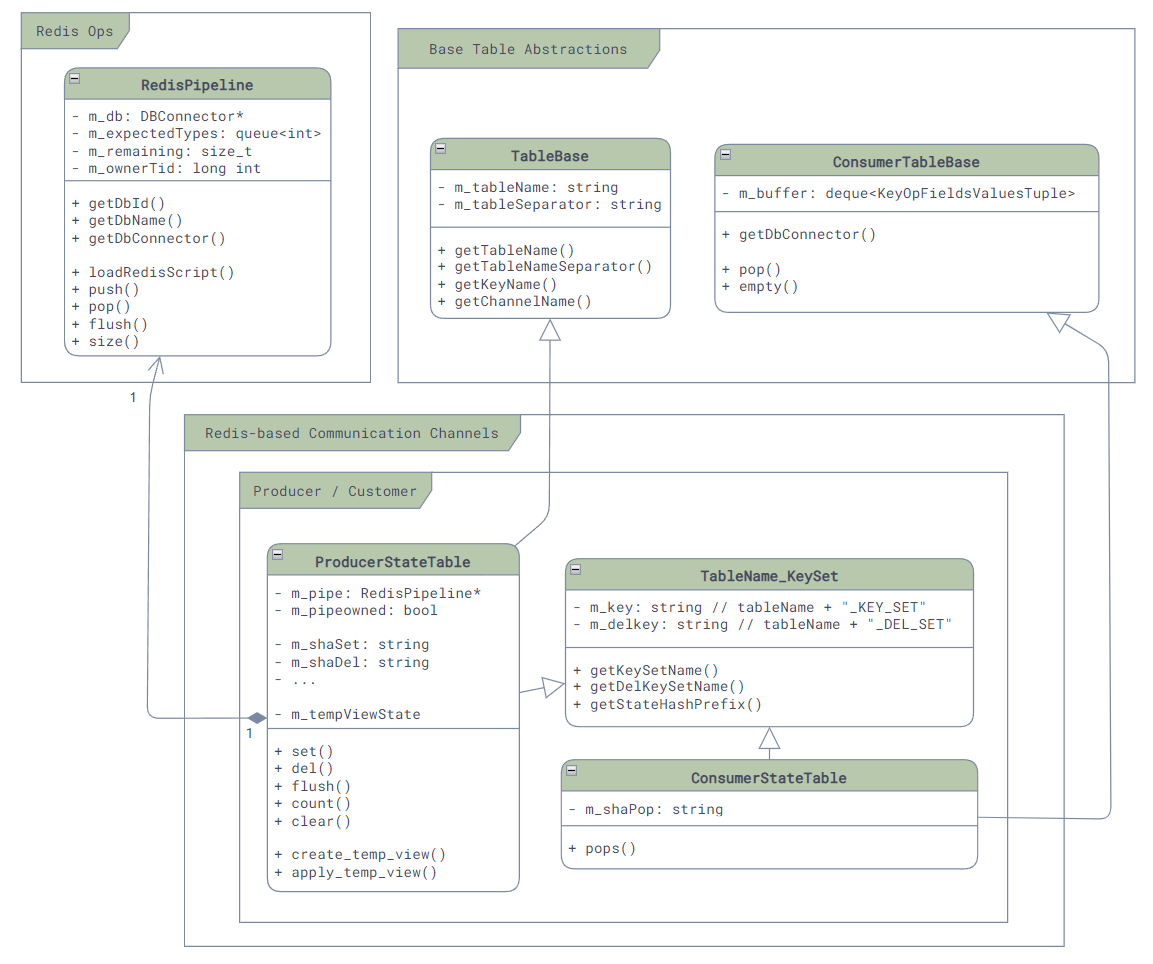ProducerStateTable / ConsumerStateTable
Although Producer/ConsumerTable is straightforward and maintains the order of the messages, each message can only update one table key and requires JSON serialization. However, in many cases, we don't need strict ordering but need higher throughput. To optimize performance, SONiC introduces the fourth, and most frequently used, communication channel: ProducerStateTable and ConsumerStateTable.
Overview
Unlike ProducerTable, ProducerStateTable uses a Hash to store messages instead of a List. This means the order of messages will not be guranteed, but it can significantly boosts performance:
- First, no more JSON serialization, hence its overhead is gone.
- Second, batch processing:
- Multiple table updates can be merged into one (single pending update key set per table).
- If the same Field under the same Key is changed multiple times, only the latest change is preserved, merging all changes related to that Key into a single message and reducing unnecessary handling.
Producer/ConsumerStateTable is more complex under the hood than Producer/ConsumerTable. The related classes are shown in the diagram below, where m_shaSet and m_shaDel store the Lua scripts for modifying and sending messages, while m_shaPop is used to retrieve messages:

Sending messages
When sending messages:
-
Each message is stored in two parts:
- KEY_SET: keeps track of which Keys have been modified (stored as a Set at
<table-name_KEY_SET>) - A series of Hash: One Hash for each modified Key (stored at
_<redis-key-name>).
- KEY_SET: keeps track of which Keys have been modified (stored as a Set at
-
After storing a message, if the Producer finds out it's a new Key, it calls
PUBLISHto notify<table-name>_CHANNEL@<db-id>that a new Key has appeared.// File: sonic-swss-common - common/producerstatetable.cpp ProducerStateTable::ProducerStateTable(RedisPipeline *pipeline, const string &tableName, bool buffered) : TableBase(tableName, SonicDBConfig::getSeparator(pipeline->getDBConnector())) , TableName_KeySet(tableName) // ... { string luaSet = "local added = redis.call('SADD', KEYS[2], ARGV[2])\n" "for i = 0, #KEYS - 3 do\n" " redis.call('HSET', KEYS[3 + i], ARGV[3 + i * 2], ARGV[4 + i * 2])\n" "end\n" " if added > 0 then \n" " redis.call('PUBLISH', KEYS[1], ARGV[1])\n" "end\n"; m_shaSet = m_pipe->loadRedisScript(luaSet); }
Receiving messages
When receiving messages:
The consumer uses SUBSCRIBE to listen on <table-name>_CHANNEL@<db-id>. Once a new message arrives, it calls a Lua script to run HGETALL, fetch all Keys, and write them into the database.
ConsumerStateTable::ConsumerStateTable(DBConnector *db, const std::string &tableName, int popBatchSize, int pri)
: ConsumerTableBase(db, tableName, popBatchSize, pri)
, TableName_KeySet(tableName)
{
std::string luaScript = loadLuaScript("consumer_state_table_pops.lua");
m_shaPop = loadRedisScript(db, luaScript);
// ...
subscribe(m_db, getChannelName(m_db->getDbId()));
// ...
}
Example
To illustrate, here is an example of enabling Port Ethernet0:
-
First, we call
config interface startup Ethernet0from the command line to enable Ethernet0. This causesportmgrdto send a status update to APP_DB via ProducerStateTable, as shown below:EVALSHA "<hash-of-set-lua>" "6" "PORT_TABLE_CHANNEL@0" "PORT_TABLE_KEY_SET" "_PORT_TABLE:Ethernet0" "_PORT_TABLE:Ethernet0" "_PORT_TABLE:Ethernet0" "_PORT_TABLE:Ethernet0" "G" "Ethernet0" "alias" "Ethernet5/1" "index" "5" "lanes" "9,10,11,12" "speed" "40000"This command triggers the following creation and broadcast:
SADD "PORT_TABLE_KEY_SET" "_PORT_TABLE:Ethernet0" HSET "_PORT_TABLE:Ethernet0" "alias" "Ethernet5/1" HSET "_PORT_TABLE:Ethernet0" "index" "5" HSET "_PORT_TABLE:Ethernet0" "lanes" "9,10,11,12" HSET "_PORT_TABLE:Ethernet0" "speed" "40000" PUBLISH "PORT_TABLE_CHANNEL@0" "_PORT_TABLE:Ethernet0"Thus, the message is ultimately stored in APPL_DB as follows:
PORT_TABLE_KEY_SET: _PORT_TABLE:Ethernet0 _PORT_TABLE:Ethernet0: alias: Ethernet5/1 index: 5 lanes: 9,10,11,12 speed: 40000 -
When ConsumerStateTable receives the message, it also calls
EVALSHAto execute a Lua script, such as:EVALSHA "<hash-of-pop-lua>" "3" "PORT_TABLE_KEY_SET" "PORT_TABLE:" "PORT_TABLE_DEL_SET" "8192" "_"Similar to the Producer side, this script runs:
SPOP "PORT_TABLE_KEY_SET" "_PORT_TABLE:Ethernet0" HGETALL "_PORT_TABLE:Ethernet0" HSET "PORT_TABLE:Ethernet0" "alias" "Ethernet5/1" HSET "PORT_TABLE:Ethernet0" "index" "5" HSET "PORT_TABLE:Ethernet0" "lanes" "9,10,11,12" HSET "PORT_TABLE:Ethernet0" "speed" "40000" DEL "_PORT_TABLE:Ethernet0"At this point, the data update is complete.
References
- SONiC Architecture
- Github repo: sonic-swss
- Github repo: sonic-swss-common
- Redis keyspace notifications
- Redis Transactions
- Redis Atomicity with Lua
- Redis hashes
- Redis client handling